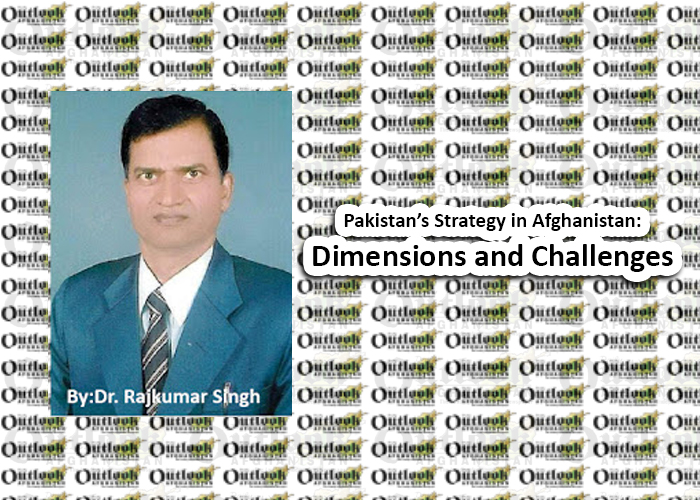The independent Pakistan found a golden opportunity to enter in Afghan politics and society openly when in December 1979 the Soviet Army intervened in Afghanistan and installed a pro-Soviet Government to curb the anti-Communist forces in the country, perhaps, forgetting the fact that it was the phase of Cold War in international politics and the United States of America will respond instantly to check/control the increasing influence of USSR in the country and the region as well. As expected by all, apart from criticizing the acts of Soviet Union by the nations of the world, the United States, in particular come forward and with the active help and support of Pakistan prepared a group of youths of surrounding countries, including Afghanistan, Pakistan and others to give a potential fight to the Afghan Army backed by the Soviet forces. They were taught, trained and fully prepared with full arms and ammunitions supplied by the US and ultimately after one decade of intense fighting, the Soviet forces withdrew from Afghan being defeated by Mujahideen, the private militia army, nurtured and controlled by Pakistan. Taking benefits from the Soviet exit and prevailing situation of civil war, anarchy, and rampant violence, Taliban-a group of Afghan students who are totally committed to form an Islamic State in the country, formed in 1994, assumed power in 1996 and rule at the close of 2001, when they were dethroned by the US in response to its launch of war against the terror groups, mainly in search of Al-Qaeda chief Osama bin Laden, the mastermind of fatal disaster that took place in the US on 9/11, an unforgettable blot on superpower’s face forever. The twice beginning of war in Afghanistan left no option before the US but to seek Pakistan’s active co-operation, without which nothing was possible.
Primary Objectives
From the day of its creation the whole policy of Pakistan-national and international has been India-centric and this universal truth too applies in case of Afghanistan where the entire sum of Islamabad’s activities focused on harming India in ways more than one and, thus, Pakistan has got, in the form of Taliban, a source of terrorizing and frightening India apart from making foil Indian investment and efforts in reconstruction of torn Afghanistan during the phase of violence and thereafter. In today’s context and for the days to come its objectives include; a. to undermine New Delhi’s influence in Afghanistan while promoting its own, b.to maximise Taliban’s influence in a weak Kabul government, c. to maintains strategic depth against an Indian invasion, d. to facilitate training and operations by Pakistani-backed extremist group, e. to marginalise historical Afghan claims on Pakistani territory, f. to develop trade relations with Central Asian Republics, and h. to curb other state’s influence in Afghanistan. Of the all objectives, Pakistan has got some measure of success in keeping the Kabul government weak and off-balance and supporting the Taliban a safe haven to the group’s leadership as well as continuing insurgency and preventing Afghan government from asserting more authority. But on the other side, its meagre investment of $1.3 billion stands nowhere while comparing $300 million development assistance provided by India and as a result Pakistani works are invisible in the whole of Afghanistan. It is also lagging far behind India in in terms of economic links and export markets in Central Asian Republics (CARs).
Afghan-centric strategy
While viewing Pakistan’s objectives in Afghanistan in detail, it appears that Islamabad wants to make Kabul its colony in traditional sense to use, misuse and abuse it for the benefits of Pakistan with the active support and co-operation of Taliban. By training, funding, munitions, supplies and safe haven to Taliban and Haqqani network, in one stroke it targets India, Afghan government, and the US as well. In the matter of peace negotiations, from the beginning Pakistan has made itself essential by preventing moderate forces of the Taliban from participating in talks as Islamabad had always become a barrier in peace progress of which Pakistan was not a part in order to give three clear messages: a. it controls who participates in reconciliation, b. it must play a central role in any discussions on ending violence in Afghanistan, and c. it will obstruct negotiations that do not advance its own interests. The aid and assistance that Pakistan has provided to Afghanistan also aimed to expand its trade and export in Central Asian Republics in addition to Afghanistan on the one hand and erect an obstruction in India’s excess to these countries by blocking its route. However, despite all efforts Pakistan has not succeeded in preventing regional integration in Afghanistan, expand its own reach into CARs or undermine Indian economic or political influence. The main reason for Pakistani failure in its mission owes largely to its internal rivalry between civilian leadership and the security institutions and Pakistan’s continuing support for Jihadists, the Haqqani network in particular, have isolated Pakistan with its potential partners in the region and beyond.
Home » Opinion » Pakistan’s Strategy in Afghanistan: Dimensions and Challenges
Pakistan’s Strategy in Afghanistan: Dimensions and Challenges
| Dr. Rajkumar Singh

